Thelma & Louise Pt 4: The Call of the Wild
 Wednesday, May 25, 2016 at 1:11PM
Wednesday, May 25, 2016 at 1:11PM 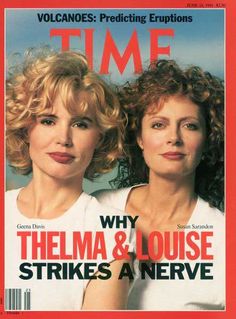 25th Anniversary Five-Part Mini Series Event
25th Anniversary Five-Part Mini Series Event
Pt 1 (Anne Marie & Margaret)
Pt 2 (Nick Davis)
Pt 3 (Daniel Crooke)
Pt 4 by Nathaniel R
When Daniel wrapped up part three, he astutely described the roomful of men watching Thelma's armed robbery on TV as "blockheaded." As loathe as I am to admit it, the other adjective he used, "slack-jawed," is the one that would also apply to me in that scene. It's when I most fully relate to the men in the movie. How can you watch what these women (and actresses) are doing and not be a little dumbstruck?! Although in my case, it's more awestruck than horrifed trepidation about what they're capable of.
1:15:00 In one of the funniest exchanges in the movie, Thelma worries about how fast Louise is driving, their unruly mops whipping around in the wind, both of them reenergized by Thelma's sudden resourcefulness...
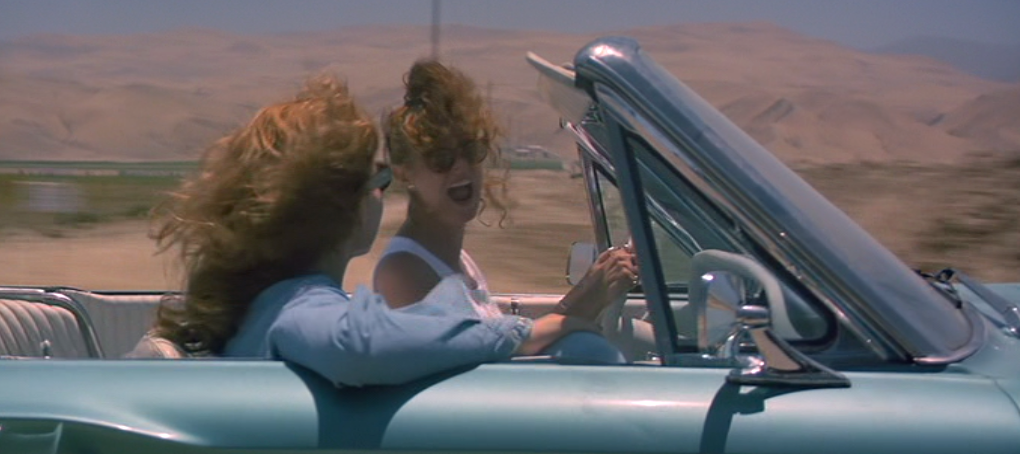
"I want to put some distance between us and the scene of OUR LAST GODDAMN CRIME!"
Their enthusiasm as they answer Thelma's "Call of the Wild!" is fun but it's also forcefully cheerful, one decibel too loud; they're a little bit astonished at their own behavior and performing for each other. But, listen, sometimes laughing or crying are the only two suitable responses to a given event and bless this beautiful movie for (nearly) always understanding when to opt for one and when to opt for the other, whether or not you have to force it. And that the movie does with its foot heavy on the gas petal as well as in its quiet moments is really quite a feat.
Louise wishes for the first time that her Thunderbird wasn't green. Isn't it more aquamarine?
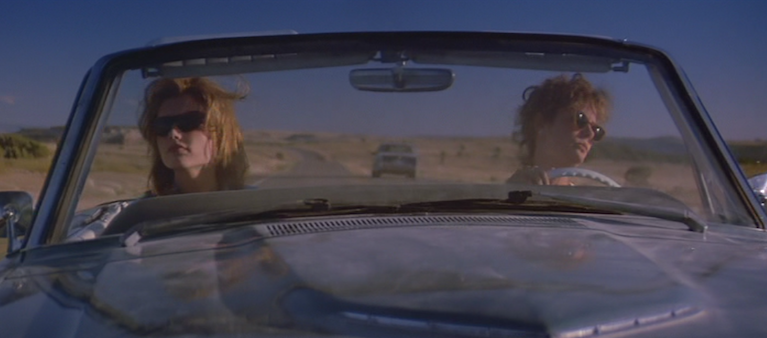
1:15:00 As Nick pointed out, Ridley Scott and Thom Noble are remarkably astute about when to use two-shots and when to keep the friends separate in their own frames. For most of this portion of the movie they're a unified front and sharing the frame which is how we like it. Too many directors have no sense about two-shots anymore, preferring to keep everything in one actor tight close-ups. The excuse for this used to be that directors were directing for their movie's afterlife on television where screens were much smaller. But given that TVs get bigger all the time and most small devices can now project on to your TV at one, can't we please go back to more medium shots and see actors interacting?
Anyway, back to the road. It's telling that immediately after their funny if forced cheer, they click back to their defaults. "Thelma, don't you litter!" - Louise in Mother Hen mode.
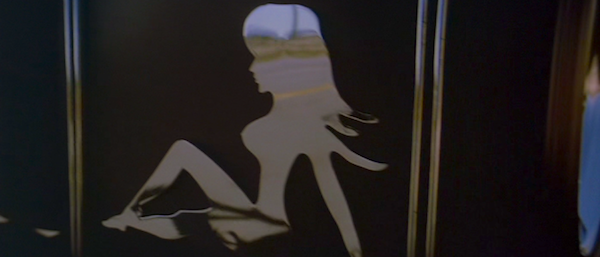
1:16:48 "Oh Lord. How original," Louise groans as they pass a honking truck and are visually assaulted by its booby mudflaps. The driver is even more aggressively sexist, waving his tongue lecherously at our heroes. I refuse to screencap him but let's just say that it's the only performance in the movie that might condemn Christopher McDonald's Darryl as "too subtle."
Louise flips him off for all of us.
1:17:30 I had forgotten that Jimmy has a final itty-bitty scene to keep us up to date on the police hunt.
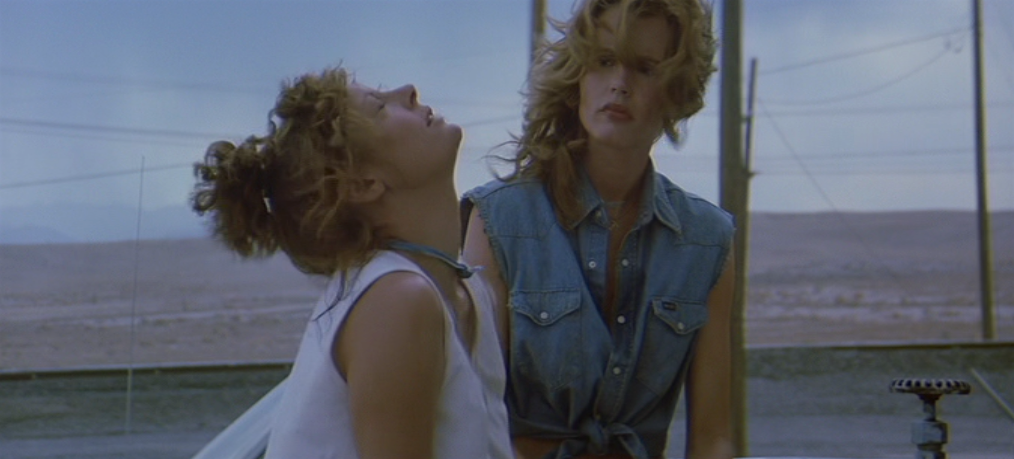
1:18:04 One of the things I most admire about Thelma & Louise is its confidence in reflective longeurs. They may be running from the law but the movie is never in too much of a hurry. 80 minutes into a movie is usually the time to speed up, not slow down, but Khouri and Scott understand the arrhythmic stop and start momentum of road trips and their emotional range, too. Moments of silence will suddenly smother the chit-chat.
I'd argue that this scene -- which could theoretically be left on the cutting room floor with no effect on the story -- is one of the film's most important. In a barely noticeable non-flagged way it's the final "pause" (not literally but we'll get to that in a minutes) before the last explosive act of the film. Louise wets her neck, trades all her jewelry (including the engagement ring?) for an old man's hat, and explains to Louise that there's no way to prove their story about Harlan legally. There's even a subtle final costume change for the film as the women restyle their looks and accessories (without actually changing clothes).
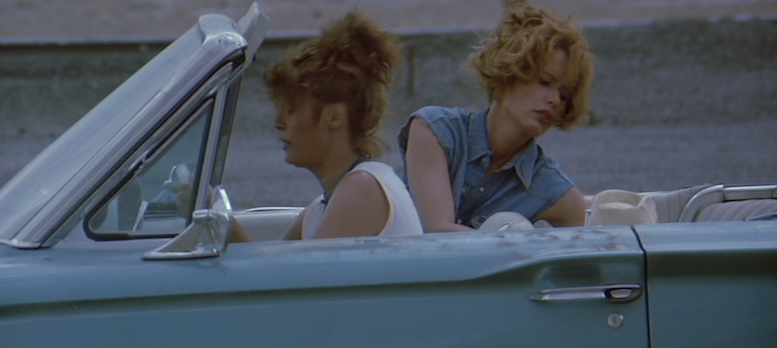
1:20:09 "The law is some tricky shit, isn't it?" Thelma remarks as they return to the car, but the astute capper on the sequence is actually her subsequent curious glance at Louise's new hat. When questioned Louise says she stole it. This is a perfect touch in Callie Khouri's Oscar winning screenplay and Sarandon's line reading exquisitely blunt. Along with the earlier sloughing off of her last worldy possessions (often a warning sign in suicides) it cements Louise's nihilistic embrace of her own lawlessness. This my friend's is a literal lie that's telling the emotional truth.
1:21:00 We return to the police investigation. JD is now in custody with Detective Slocumb interrogating him. This is the only scene without the actresses that's totally rich on an acting level. While Brad Pitt's performance has been justly celebrated over the year's as a movie star breakthrough, the actual quality of his character work is rarely discussed. Suddenly paired with his own antagonists, the Detective and Thelma's Husband Darryl, both immune to his charms, JD's full character is more nakedly visible. You can see that charming devil posing, the flirtatious smiles, the entire bag of tricks he uses to escape consequences cut off halfway across his face repeatedly, as he squirms under Harvey Keitel's unblinking stare. I'll just put it bluntly: Bugsy has two Supporting Actor nominations that year at the Oscars but it was Thelma & Louise that deserved the double dip for Keitel and Pitt.
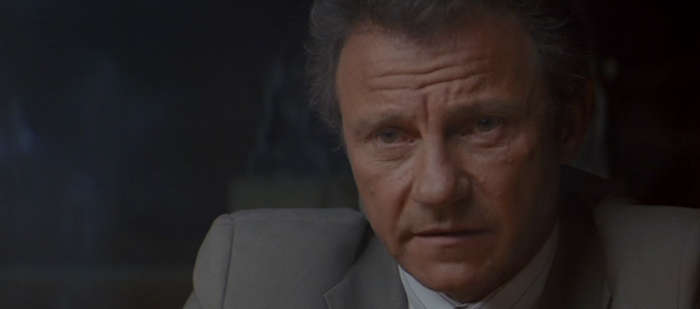
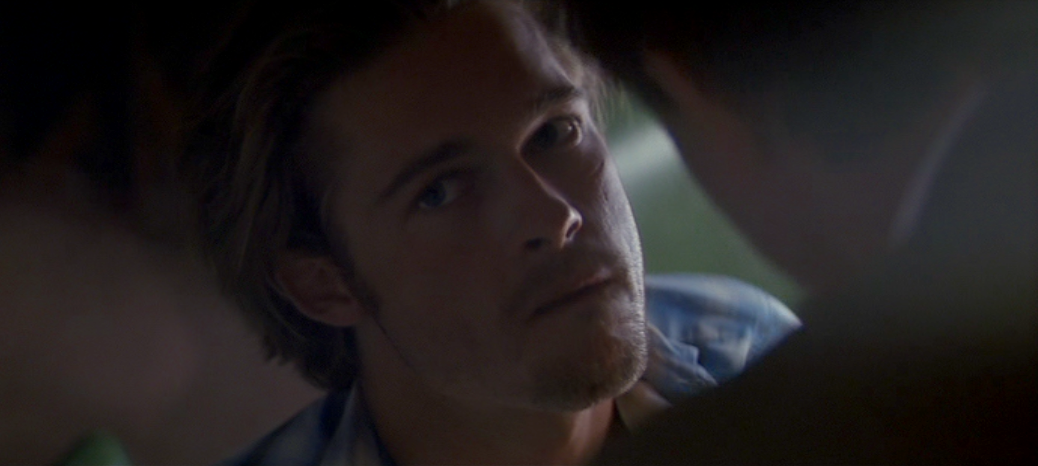
You're starting to irritate me.
The scene is two whole minutes long and Thelma and Louise aren't in it and it's still thrilling to watch somehow. Keitel has a rare chance to bring new shades of feeling to his tough guy act, which is usually deployed for more violent and disreputable characters. Here his rage is not from a morally questionable personal agendas but altruistic at its base. He sees the injustices and predicament of the women fairly clearly. Louise aside, this is the only person in the movie who has the haunted quality of already knowing its ending.
There's two girls out there that had a chance. They had a chance."
1:24:24 Outside of the interoggation room, we get our last taste of JD's callow narcissism. Attempting to regain his swagger, he finds the perfect victim in Darryl, pantomiming intercourse for the now beat-red husband. It's just desserts for Darryl - fan service, really. But it has a bitter aftertaste, the reminder that JD is also a total prick. Albeit a charming one.
1:26:06 Thelma calls home and hangs up on Darryl after one word. He's too cheerful. "He knows." The phone is tapped. It's a pretty great joke.
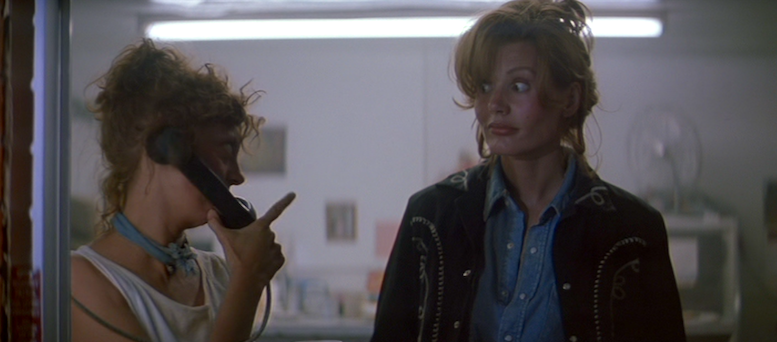
1:26:20 It's Louise's turn to call. Bless Ridley for keeping the ladies in two shot during this whole sequence and Geena & Susan for being so alive in each moment. It gifts the movie with such spontaneity in feeling and nuance in character arcs. Simple gestures, whether dramatic or comic, like Louise's (literal) tongue in cheek understatement to the Detective "I've been better" or comic gestures, or their physical banter, if you will, (finger pointing and eyebrow raising) when "armed robbery" comes up, feel so in the moment and unrehearsed.
1:28:06 Realizing that Thelma told JD they were going to Mexico, Louise gives another lecture and smart but depressing advice. "You gotta stop talking to people. You gotta stop being so open."
1:29:15 A strange "comic" insert of the cops watching an old movie on TV at Darryl's house. He tries to change it to sports but they object. Does anyone know what the movie is?
My god this is beautiful."
1:29:50 Thelma is talking about the landscape but we're whispering it in unison with her about the movie. Thelma says she's never travelled but always wanted. Cue: song break.
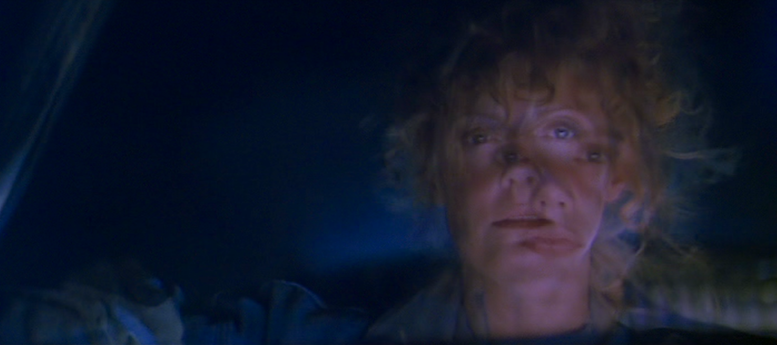
1:30:13 Song break. "The Ballad of Lucy Jordan" as with Chapter 2's on the nose "crossroads" lyric, this choice is less than subtle. A woman of 37 reflecting on the list of things she'll never do now, like... you guessed it TRAVELLING!
I've never really understood the choice to dissolve back and forth and back again between the women as they listen to the song rather than have them both in the shot. Are we meant to view them as wholly fused now? Or is it simple economics to speed through a double "lost in headspace" moment.
1:31:18 Thelma dozes off and we reach my personal favorite scene. I'll let the pictures do the talking as it always renders me speechless
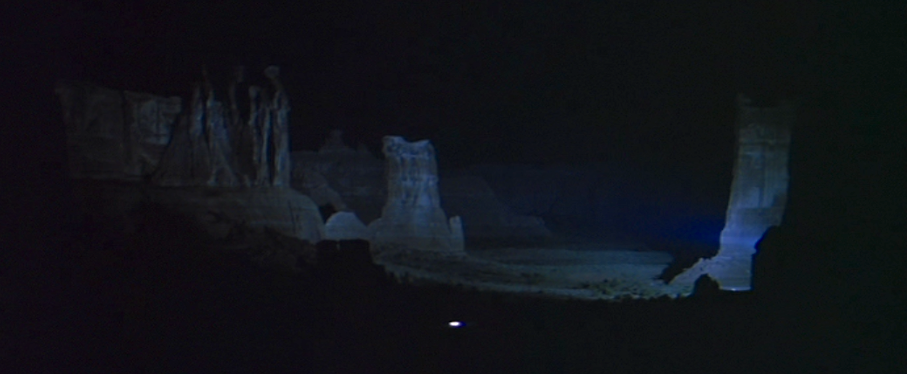
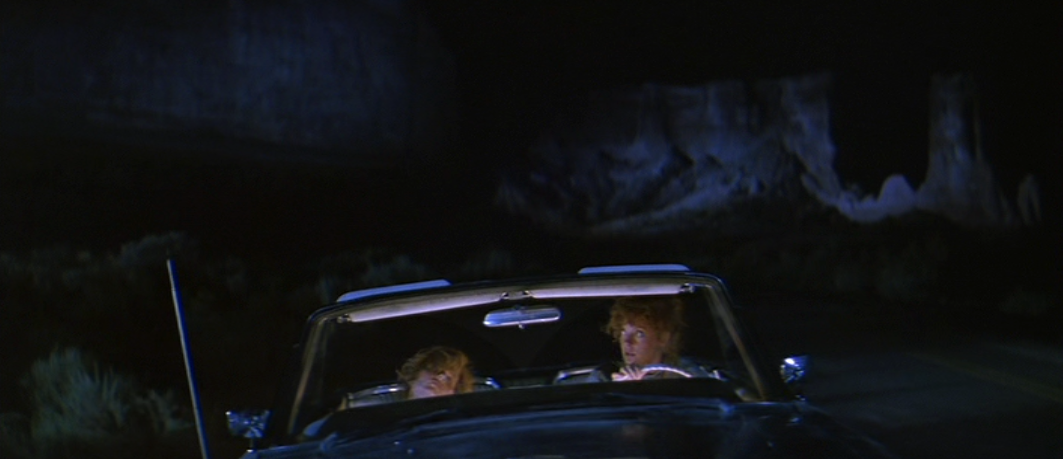
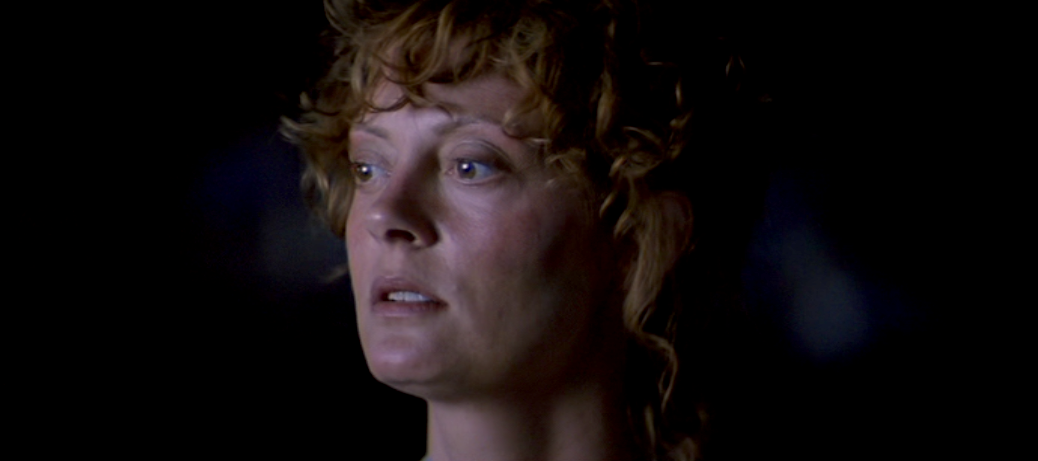
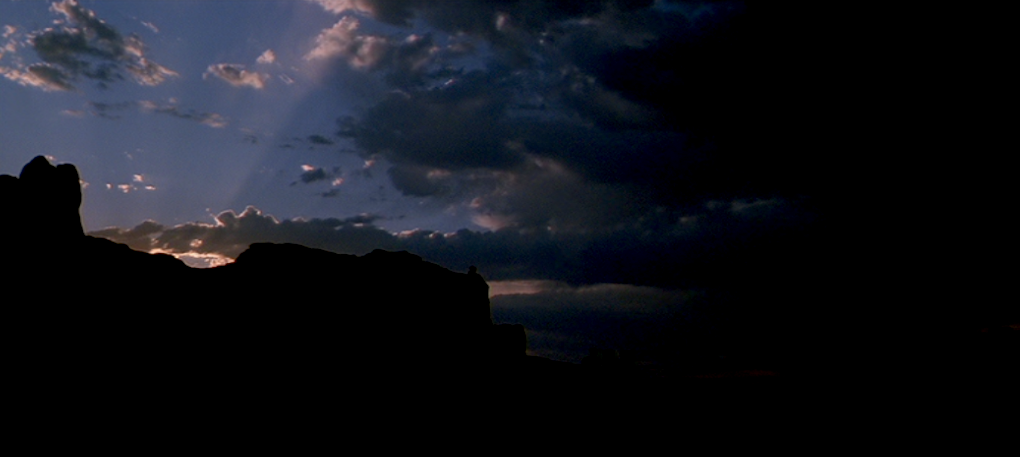
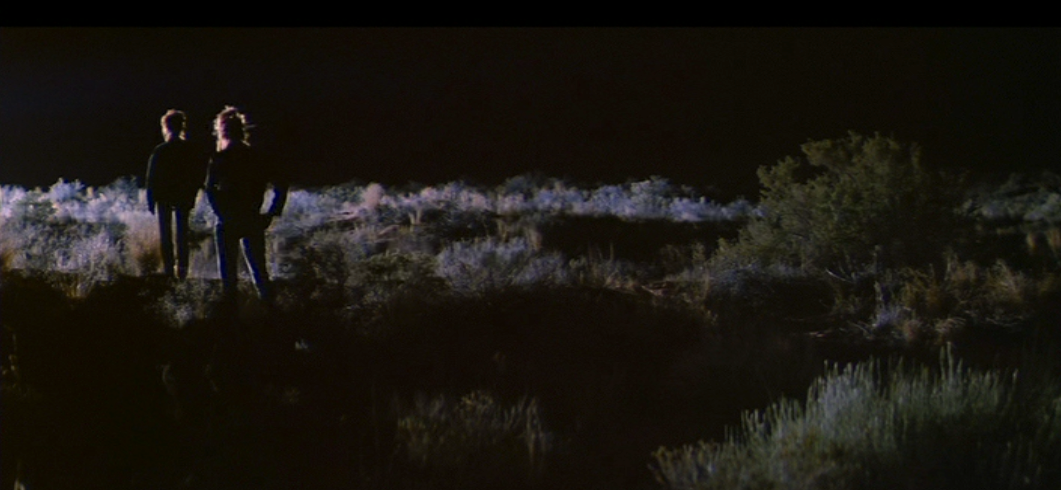
This dialogue-free sequence, one which Susan Sarandon herself suggested if I recall correctly (not in the original script), which the Oscar nominated Adrian Biddle (RIP) shot so perfectly, is a perfect example of how the cinematography uses the landscape to aid the myth-making throughout the picture. It's the kind which sends you into deep reflection right along with Louise.
In this meditative moment, then, a brief personal anecdote: I was overseas in 1990 and 1991. They were the two years in my life when I spent the least time in cinemas (dark days, readers, dark dark days). So, though I missed the talking point phenomenon of Thelma & Louise as it occurred in real time, I came home at Christmas of 1991 with a huge list of movies to see. As I tore through two years of cinema trying to catch up the single film that struck me hardest was Thelma & Louise. I saw it with one of my closest friends from high school (Geena Davis was his favorite actress). He had been diagnosed with Leukemia shortly before I had come home. We watched movies together and talked and talked with so much to catch up on. He died that summer in 1992 between our birthdays which were just a week apart. This movie will always make me think of him, even though he was in some obvious ways a 'guy's guy' and Thelma & Louise was not at all a predictable reference point.
But such is the power of the truly special films. They can become part of the fabric of your life so deeply and in such surprisingly intimate ways that you are not yourself without them.
1:32:11 Some light and then heavy-handed comedy to pull you back out of your own head. Thelma struggles with maps tossing it aside "Well, we don't need the East Coast anymore." Ha. Than that sexist pig truck driver again.
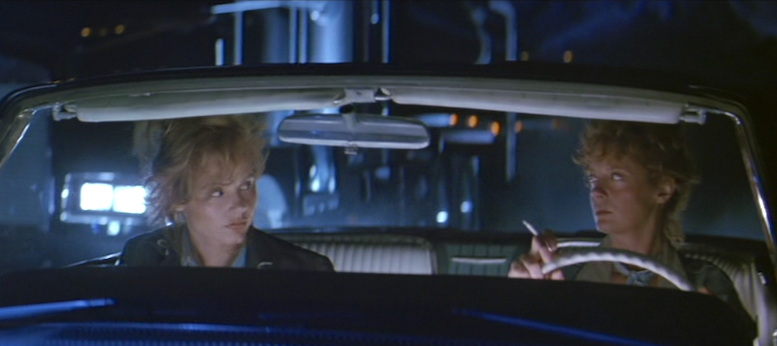
1:32:36 "I ignored him." If Thelma gets to ignore him, we should be able to to. Stop it with that damn truckdriver, movie!
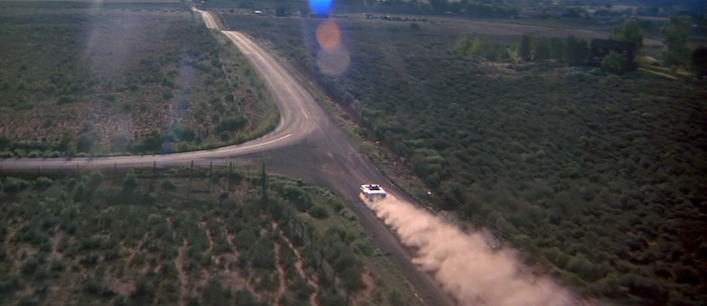
1:33:03 This overhead shot has always moved me. The Thunderbird speeds toward its destination, trailing smoke, ignoring other roads; Thelma and Louise are long past considering an alternate path.
1:33:40 Thelma starts laughing remembering Harlan's death. The discomfort this movie shoves at you so brashly! It's never afraid of tonal curveballs to keep you engaged. I remember some critics felt the movie was too harsh on men -- like fan service for women -- but really, the movie doesn't pull punches for anyone. Though it's highly entertaining it's never quite an "easy" watch. They make so many mistakes, they hurt each other, they lose control. Louise gets angry. Thelma doesn't think. Etcetera.
Then Thelma brings up the subject that you don't bring up with Louise, in the boldest way she ever has. (How do Texans feel about this movie with Texas as a symbolic stand-in for rape?)
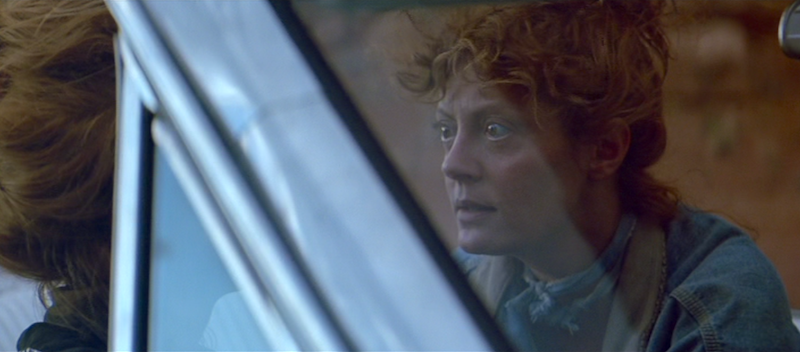
Look I'm warning you. Just drop it. I'm not going to talk about that. You understand?
A lesser movie would make Louise talk about it. All credit to Khouri's screenplay and her thorough understanding of these two personalities that Louise never will, as cathartic as it might have been for her at some other juncture in her life.
1:35:29 My time with the movie runneth out. A cop pulls them over. And as they see the square jawed masculine office approaching in the rear view, Louise remarks "Oh god, he's a nazi." Suffice it to say that this doesn't go well for the officer though there's this delicious comic image of our actresses doing their best fake acquiescient 'we're just silly girls' looks to provoke cop mercy. Perhaps he'll let them go with a warning?
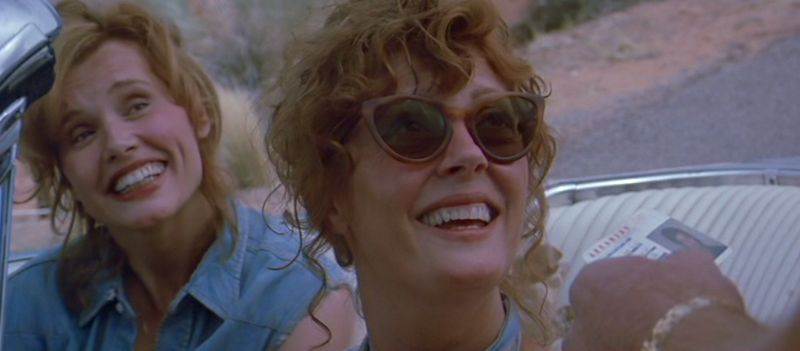
This ranks as my second least favorite scene, though Louise's deer in headlights look when Thelma goes outlaw on the comic is hilarious. But locking a man in a black uniform in a trunk in the desert? Hasn't anyone behind this movie ever driven through the Southwest. Two air holes aren't going to cut it!
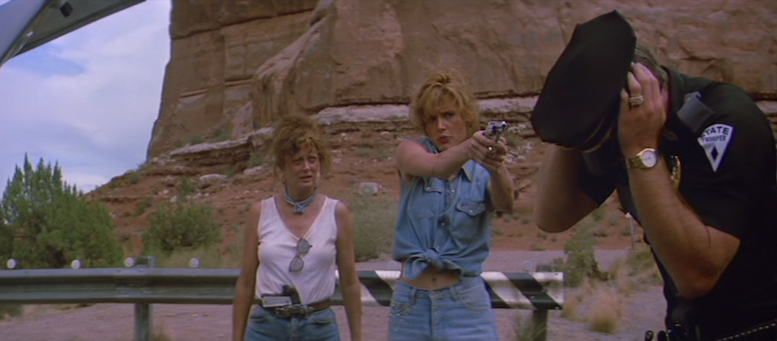
My husband wasn't sweet to me and look how I turned out.
1:39:35 Again we have comedy to cut the awfulness of what's happening but this one time it doesn't work for me...and as much as I love the movie, I do wonder if these last 25 or so minutes push things into territory that's perhaps a bit too broad for all the nuance and careful rendering that's come before. As the girls speed away from crime number... I've lost count... my sympathies are trapped in that trunk. At least for a few scenes more.
But my time is up... Laurence Barber drives us through the finale in Part five!



Reader Comments (17)
Nice to hear how this film entered the fabric of yourself,I'd never thought of myself not being me without these special movie moments,thanks for a great write up.
I'd have nommed Pitt too he doesn't get nearly enough credit here,Yes it is a Julia in Pretty Woman moment,who is this???
I am willing to bet he has no more than 15-20 total minutes in the whole movie and he is straight FIRE. Scorching hot!
Texas represents oppression in its most extreme form. I always wondered if male Texans whenever they saw Thelma and Louise relished the oppressive rep the movie implies it represents. I think about Jodie Foster attending a regular movie theater screening of The Accused and being horrified by men in the audience applauding the extended rape sequence. Texans take pride in the singular extremeness of their identity. So these characters fearing to tread there is more of an ego stroke than an insult.
Which brings me to my initial point about this story being about white Americana. These characters if they were from different class backgrounds or entirely different regions of he country or a different race this would be an entirely different beast altogether.
"I've never really understood the choice to dissolve back and forth and back again between the women as they listen to the song rather than have them both in the shot."
My guess is that Scott is trying to tell us that these gals are now in total communion and somehow he's preparing us for the ending. I distinctively remember that I started to cry the moment I heard the first note of Lucy Jordan at the movie theatre and I did not stop until the end.
I cry buckets with Thelma & Louise. It's up there next to Terms of Endearment and Brokeback Mountain.
The truck driver and this state trooper were my least favorite parts of this movie. The film is so effortlessly hilarious it doesn't need to be goofy.
I believe this move is about women, not race. And who would have thought that Thelma and Louise and Death Becomes Her would become female buddy classics from the 90's? Fascinating.
One of my favorite movies of all time.
The scene with Thelma laughing at Harlan's death is pivotal. It shows us who these two women are in this moment, and how that earlier moment of violence has changed them forever. A typical Butch and Sundance male-centered buddy movie would never include a moment like this.
You're so right that a lesser film would have included a scene in which Louise tells Thelma what happened in Texas. The look in Sarandon's eyes every time the subject comes up tells us all we need to know.
I loved this movie back when it came out, what strikes me now is how contemporary it still is.
I don't think the film is too hard on men, the casual sexism you find so crude and over the top is part of life for any woman.
Thelma and Louise became embedded in the culture, if you are 2 women on a road trip the film comes to mind. I've spent a lot of time listening to that soundtrack while driving and it may be a little on the nose but it's wonderful to listen to.
/3rtful -- that's a good point that Texans might actually be proud of such a disreputable association. Well some of them at least. It's a weird giant red state.
Biggs - thanks. I also think Thelma laughing is pivotal. it's a weird moment of uninhibited saying what you're thinking which she knows is awful when she's saying it but can't stop herself.
ladyedith -- i don't think the casual sexism is unrealistic! I just think that particular performance is miles over the top ;)
rogue -- you never know what movies are going to last but i think it was always obvious that T&L would..
Nathaniel,
The whole world has been
a very texan weird giant red state for women since always all around.
And very proud of it.
Only we women know how.
Jennifer 1994 -- my heart aches reading that. Which must be why this movie resonates on such a grand scale
As a straight man from Texas, I hate the Texan stereotype. I hate that we are a stand-in for rape, I hate that we are a giant red state. I hate the broad generalizations.
But, most of then are fairly accurate. All I can do is not add to the stereotype.
More on subject, Geena Davis has the sex appeal turned up to 11 in the last half of this movie. Good lawd.
Ben -- right? they both actually get sexier and sexier as the movie goes which is, I think a wonderful visual compliment to their thematic new agency over their lives
The bit where Thelma starts laughing (a little hysterically) about Harlan's death is one of my very favorite scenes in T&L. It's funny, shameful, and powerful, all at once. Geena Davis's performance is particularly fine here.
This movie is Alien's nice human sister. The way Scott uses the power of filmmaking to create a world of growing menace is on expert display in both works. There's a sense of exhilaration even as the air of dread blankets everything. I really wish Scott could have achieved more of this in his recent projects, even something as silly as The Counselor, which really could have used it.
So true that this desert night sequence invites audience association. With all the iconography that gets remembered for T&L, it deserves way more praise for how intuitive it is about what the audience needs in order for the final moment (and the whole film) to be as transcendent as it is.
Another excellent entry in this great series. I like the points about the pacing of the road trip - it doesn't have to be fast all the time, even towards the end.
I don't mind that the use of 'The Ballad of Lucy Jordan' isn't subtle. My guess is that the feelings that Louise is feeling at that moment aren't subtle either.
Keitel should so have been nominated for this rather than Bugsy. Not only is he better here, it's one of the warmest and most individual performances of a good-hearted cop I've seen.